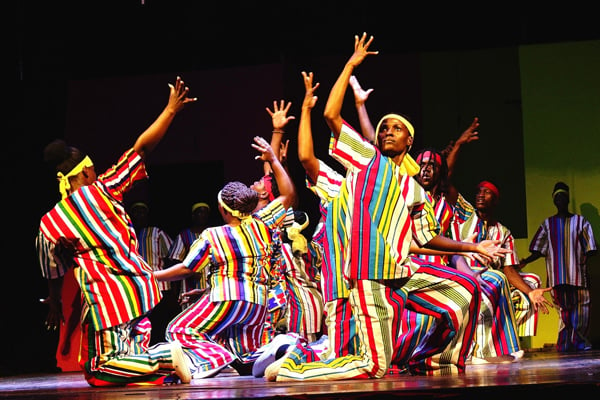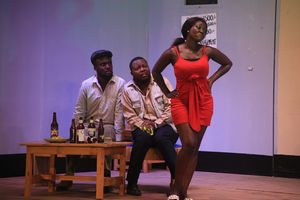
Part of the cast in one of the scenes in Kulumbisi and Kulunkalu by Alex Mukulu at the National Theatre in Kampala.
Why have you returned to the National Theatre after many years?
I have never quit. I was in other areas doing theatre, not in Uganda. Okay, it is a return to Uganda’s theatre. And the reason I am returning is because after watching our community for those years, I think I have discovered and found out a lot to say.
Why have you adopted Shakespeare’s Romeo and Juliet for this production?
It is because of its divine theme of love; secondly, its universality; and thirdly, its youthfulness. And the deaths which unite people and loss act like a conflict resolution anecdote, which I think we lack in Uganda. So much blood has been shed but our conflicts have not been resolved.
I adopt it again because of the level at which we must now talk to the world. I think we have become a global village now. So, choosing to make a version of Romeo and Juliet, a book written by Shakespeare and known all over the world allows me to talk to other people in other countries with something that resonates with them, which could not be with a local play. So, in wanting to talk to the whole world, one has to choose some global issues or global classics like Romeo and Juliet in order to speak to everyone.
What informed the choice of title?
Kulumbisi is the name of the green grasshopper. Kulunkalu is the name of the brown grasshopper. Normally, the green grasshopper is a little bit larger than the Kulunkalu. And when you put these grasshoppers in one bottle or calabash, they eat each other in spite of the fact that they are all grasshoppers, which is what is already happening here in Uganda. We are eating ourselves politically, socially and spiritually.
How did you Africanise Shakespeare’s classical work?
By using our stories and music but also using parts of Romeo and Juliet to bring out the theme of love, which love might or ought to bring us together. Which love ought to solve our conflicts, and whose deaths helped to solve their families’ feud. Therefore, we use our own stories and music, but with parts of the real book of Shakespeare to put them together in a musical, which ends up with a desire to have a Romeo and Juliet in our community, whose deaths shall help us to resolve our conflicts as a nation.
What has caused the conflict between the yellow city and the red ghetto?
It is about the haves and have-nots, which is again about Kulunkalu and Kulumbisi—the Kulumbisi being fatter than the other one. The haves are a bit larger, and the people are bigger, fat and healthy-looking, while the people in the opposition are small, slim, desperate and angry. So, that is the difference between the haves and have-nots or Kulumbisi and Kulunkalu.

Left to right: Jannes Merksx (the Researcher from Netherlands) and Alex Mukulu (The Storyteller) in one of the scenes in Kulunkalu and Kulumbisi at the National Theatre in Kampala in April. PHOTOS | PATRICK SSENTONGO
Although Romeo and Juliet was not about class, that is the reason we adopt it to the African version. The feud between the Montigues and Capulets in Romeo and Juliet was not based on class because they were both middle-class people. However, in our context, there is so much difference between yellow and red. To contrast, yellow is like light, and red is like blood. Which blood shall we shed to be able to see the light? Now you see you have to first solve that conflict between yellow and red in order for them to come together, and for all of us to see the light.
What is the role of the White man on stage? And what does he represent?
He represents the West and presents the West at the same time. He is here on a research project on our music and he finds us rehearsing Romeo and Juliet. And then he presents to us what a muzungu here really thinks about us. And the questions they ask about us. Representation is one role and presentation is another role. He is representing them (the West) and his country through the research of our music. And he is presenting them through the very way any common muzungu would be thinking about Africans. The questions they ask in bars like ‘why are Africans lazy?’ the stereotypes they have about us.
And there is this scene where you are polishing the White man’s shoes. What does that portray?
It is not only the White man’s shoes that I am polishing. I am polishing the shoes on all sides. When a muzungu comes, you want to polish his shoes as a muzungu, meaning you may charge him more. When you bring your shoes for me to polish as [ruling National Resistance Movement] NRM party, you may think I am with you rather than the other side. When I polish the shoes of [Opposition National Unity Platform] NUP then you think that I support you. It is that hypocrisy in us where we polish the shoes of everyone to carter for our own good.
Who is this man who is ready to be killed by the new gun introduced by the Arab traders in pre-colonial Buganda?
There is this story about the king, who came to receive the guns, and his obedient people and ignorant of everything volunteered for the guns to be tried on them in order to please their king. And then the king also ignorantly tries the new gun on his subject. He squeezes the trigger and one of the men drops dead. So, the Kabaka orders for more guns. So, it is a mythical story. I brought it in because the muzungu asks: ‘what is the worst thing the West brought to Africa?’ And I said the gun. So, I use that partly to entertain and partly to say what I know about the gun.
What impact has the gun and Christianity had on Ugandan society?

Dances of Poverty by Alex Mukulu in 2000. PHOTOS | FILE
The impact of the gun is that it has taught us to proceed with violence than dialogue. We now start with the gun and end with dialogue, yet we should begin with dialogue. We are used to the gun thinking that once you have it, you have power. Of course, you have the power, however, the gun is to protect and not suppress people. The gun has not helped us apart from participating in the coups all over Africa, which we have experienced.
Faith and Christianity in a way made us lose our own sense of belonging. And once you lose the sense of belonging, you become a floating subject or individual. You do not know where to belong. That is what Christianity took away from us. It took away our musical instruments, spirituality, and self-esteem. It robbed us of our individualism or individuality. It robbed us of our character as a people. When you lose your character, you become inferior, you suffer from an inferiority complex and guilt.
What are your thoughts about schools cheating exams and Uganda being ranked among the most corrupt countries in the world?
This is what we are experiencing in this instantaneous culture—this technology which has come, television and automatic cars. Everything is like a switch. Under this culture, it is difficult for a student to sit and read the Introduction to Biology or any other big textbook like we used to do. They don’t have that patience anymore. So, he or she would rather get you money as a teacher, and you give him or her the questions. He or she just spends a minute going through them, sits for the exam, and passes it. So, it is the instantaneous culture that we are experiencing that is bringing it to everybody. Everybody wants it now. Young people want the car now, want to marry now, want the money now, and want to retire now.
How did you address the killing of the Uganda Martyrs by Kabaka Mwanga in this production?
When you look into our history as a country, who are we proud of as Ugandans? There are very few people. Uganda is viewed as a nation of faith, and the Uganda Martyrs make people very proud, and many people visit the shrines. However, as to why and how they were killed; we have very many reasons. Whether their killing was evil or not; we look at what they bring to us today. And what they did to us in terms of hope and faithfulness. It is one thing that proudly brings us together despite what might have happened in the past. It is justifiably a good thing to have happened to us.
Why does the White man point out the high levels of corruption and embezzlement in the country?

Alex Mukulu at his Residence in Ggaba in 1997.
I told him it was their fault, not ours. Corruption is from the West. The West has brought a lot of bad habits to us and now they are bringing homosexuality, lesbianism and alcohol. A lot of bad things have come with them, and a lot of good things. Corruption and embezzlement are not part of our languages, they are their own words. It is because they used to practice these things. So, they come here with all their garbage, with all their good things and all bad things. Unfortunately, the lazy ones take the bad things while the strong ones take the good things.
You presented your play in a chronological way, interchanging with many of Uganda’s major cultural and political events like the expulsion of the Indians by Idi Amin and the Entebbe raid. Why did you adopt this approach?
These are the stories that I spoke about earlier. We wanted to use our own stories to interpret Shakespeare’s love story. So, when you think of love through the expulsion of Indians, what percentage do you give love in that context? It is very minimal because it was an act of hate and not an act of love. For the Entebbe raid, all the other Israelis had been rescued from Entebbe airport, and Dora was the only old woman who had been taken ill to Mulago hospital. Amin killed this woman for what? You have already been defeated. So, it was an act of hate more than an act of responsibility. I say it is love that has to bring us together.
What happens to this production after showing at the National Theatre?
We want to have it in the East African region; that is Kenya, Rwanda and Tanzania. And then after that, we want to go to South Africa and God willing, to Europe and America. We are going to develop it further so that it gets to the international level. I am working with the International Theatre Institute to concretise these plans.
Who is ALEX MUKULU?
Alex Mukulu is a playwright and a musician born in Uganda. He has been at the centre of theatre in Uganda for the last 40 years, and a great cultural ambassador overseas. His music and plays cut across, historical, political, empowering children and women and the young generation, culture and Christianity.
His most well-known plays include: Muzukulu wa Kabangala, Engule ya Kamukukulu, 30 Years of Bananas, Wounds of Africa, I’m Not Here Because I Want, The Peasants’ Song, Dances with Poverty, Excuse me Mzungu, Radio Mambo Bado, as well as Journey to Self-Realisation, performed at the opening ceremony of the Commonwealth Heads of Government Meeting in Kampala in 2007, and many more.
His book 30 Years of Bananas, was published by the Oxford University Press in 1993.




